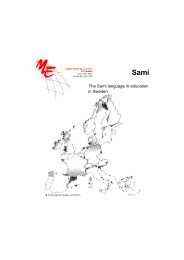Multilingual Early Language Transmission (MELT) - Mercator ...
Multilingual Early Language Transmission (MELT) - Mercator ...
Multilingual Early Language Transmission (MELT) - Mercator ...
Create successful ePaper yourself
Turn your PDF publications into a flip-book with our unique Google optimized e-Paper software.
ecognised as a language or not; in such an area individuals may be monolingual, speaking<br />
only their own variety.<br />
- 'Plurilingualism' refers to the repertoire of varieties of language which many individuals use,<br />
and is therefore the opposite of monolingualism; it includes the language variety referred to<br />
as 'mother tongue' or 'first language' and any number of other languages or varieties. Thus<br />
in some multilingual areas some individuals are monolingual and some are plurilingual.<br />
The Council of Europe policy attaches particular importance to the development of a<br />
plurilingual person with a repertoire of languages and language varieties, because the<br />
development of multilingualism is a lifelong enrichment for a person living in Europe.<br />
In Europe, there is a growing awareness of the value of linguistic diversity and the need to<br />
learn languages. The objective of the Council of Europe and the European Union is that all<br />
Europeans learn to speak at least two other languages in addition to their mother tongue. 84<br />
On basis of the different presented above, we can conclude that the terms multilingualism<br />
and plurilingualism are generally seen as a valuable asset for individuals and that the term<br />
bilingualism is often used for communities/groups. However, in this <strong>MELT</strong> paper we use<br />
mutlilingualism for individuals (young children, parents, or pre-school teachers) and for<br />
language communities. As the <strong>MELT</strong> project focuses on minority languages because in daily<br />
life, due to ever-increasing mobility, immigration and international contacts, language skills<br />
are now more important than ever (for multilingual societies and minority communities).<br />
Nevertheless, there are diverging views of multilingualism, and languages learning, and (preschool)<br />
education. Moreover, parents and practitioners are confronted with practical<br />
problems with regard to language contacts during the child’s development.<br />
This not only refers to some of the major languages of Europe, such as English, French,<br />
German, or Spanish, but also to (smaller state languages, immigrant languages, and regional<br />
or) minority languages.<br />
The equality of languages of all kinds is not self-evident. Baker (2006) shows that where<br />
bilingualism involves high-status languages it is viewed positively, as an educational<br />
advantage, and where the languages have low status, bilingualism is (in some school<br />
systems) viewed as an educational handicap, which must be overcome (Baker, 2006: 385).<br />
Cummins (2000) too describes how (bilingualism and) multilingualism are valued differently<br />
by educationalists depending on the social and political status of the languages concerned. 85<br />
As a result of this imbalanced evaluation of multilingualism, the mastery of a minority<br />
language is not always considered (and not by everybody) to be a valuable asset. Often,<br />
practical and political arguments in favour of learning English are revealed. And,<br />
unfortunately, the well-documented arguments of the mother tongue being the best basis<br />
for a good linguistic and cognitive development, and language providing of cultural social<br />
wealth are less widely known.<br />
84 Council conclusions of 12 May 2009 on a strategic framework for European cooperation in education and training ("ET 2020")<br />
85 Description from the website of <strong>Language</strong> Rich Europe <strong>Multilingual</strong>ism for stable and prosperous societies. The British Council leads the<br />
<strong>Language</strong> Rich Europe project, what is co-funded by the European Commission.They work with a wide network of partners and specialists<br />
across 20 European countries, including the European Union’s Network of National Institutes of Culture.<br />
http://languagerichblog.eu/2010/11/23/multilingualism-changing-the-mind-set [July, 2011]<br />
49



